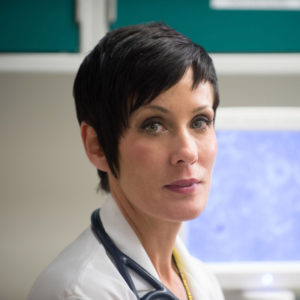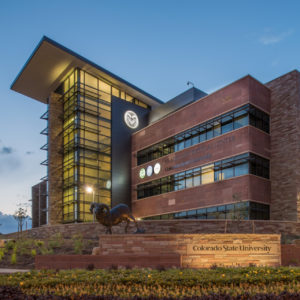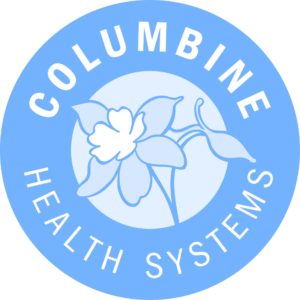Nicole Ehrhart, one of Colorado State University’s foremost experts in translational medicine, has been named director of the Columbine Health Systems Center for Healthy Aging.
Ehrhart, the first woman at CSU to receive a University Endowed Chair, is a veterinarian, board-certified surgical oncologist and professor of surgical oncology in the College of Veterinary Medicine and Biomedical Sciences. She was awarded the Ross M. Wilkins, M.D. Limb Preservation Chair in Musculoskeletal Biology and Oncology in 2015.

Ehrhart was selected to lead the healthy aging center in CSU’s Health and Medical Center after a national search. She says her vision for the center, which was launched in 2017 with a $5 million gift from Columbine Health Systems owner Bob Wilson and his wife Kitty, involves creating a place where various disciplines come together to extend “healthspan,” or the period during which one is free of diseases that limit quality of life.
Interdisciplinary hub
“The science of aging is a highly complex issue,” said Ehrhart, who starts Aug. 1. “To make a meaningful impact in improving healthspan, we need to bring multiple theories, skills and data to bear on a common problem. We need to ask how the disciplinary research strengths that already exist here at CSU can be merged, expanded and transcended. I believe that the greatest opportunity to impact healthy aging exists at the intersections between scientific disciplines. Columbine Health Systems and CSU have been visionary in partnering to create an interdisciplinary research center to address exactly that.”
Lise Youngblade, who has led the center on an interim basis as head of the Department of Human Development and Family Studies, said Ehrhart is an ideal choice.
“Having spent the last several years helping to develop the Columbine Health Systems Center for Healthy Aging, I can say unequivocally that Nicole is the perfect person to direct the center,” said Youngblade, the incoming dean of CSU’s College of Health and Human Sciences. “She brings a unique vision, passion and wealth of experience that will be enormously beneficial to the campus in uniting researchers who study healthy aging from a variety of disciplines, utilizing human and animal models, and supporting the generation and translation of cutting-edge interdisciplinary research into important programs that promote healthy and successful aging.”
Ehrhart discusses muscle regeneration and aging in this Vail Regenerative Medicine Center video sponsored by the Steadman Clinic.
Comparative medicine
Ehrhart’s work in veterinary medicine has focused on comparative oncology. For example, she’s explored how the treatment of naturally occurring osteosarcoma, or bone cancer, in dogs can inform and improve the treatment of that disease in humans, especially children.
“Leveraging the expertise that already exists here on campus, along with a world-class veterinary college that leads the pack in comparative animal models, we have an opportunity to bridge the translational gap in a way we have never had before,” Ehrhart said. “I’m excited to lead the Columbine Health Systems Center for Healthy Aging in uniting expertise and active research programs across campus to translate from discovery to novel therapeutics, programs and policies that support successful aging in both animals and people.”
She explained that while there are other centers around the country dedicated to the field of healthy aging, what makes CSU’s distinctive is the university’s highly ranked veterinary school, which provides opportunities for translational medicine, or transferring what we learn from animals to humans.

“We are uniquely positioned to make a difference in comparative medicine like no other center could because of our vet med college,” Ehrhart said. “There are existing aging centers at many universities, so if we’re going to be the new kid on the block, our center has to bring something unique. That’s where I think the magic happens, in this interdisciplinary space, where aging pet dogs can provide answers that help people age successfully, and vice versa. The levels of intersection and similarity are remarkable, and are only just beginning to be explored.”
Reverse effects of aging?
Ehrhart said she will continue to hold her endowed chair and direct the Laboratory of Comparative Musculoskeletal Oncology and Traumatology, since 25% of her new position will be devoted to research. She said she wants to continue her work on regenerative medicine, including the use of stem cells to regenerate tissue — perhaps reversing the effects of aging someday. “Ultimately, could we come up with a therapeutic solution for restoring the muscle mass we lose in aging?” she asked.
“Nicole’s energy and enthusiasm for this work is infectious, and I am excited about the collaborations she will foster and build on campus, as well as with our community and university partners locally and at the state level,” Youngblade said. “I have no doubt that under her leadership, this center will grow rapidly, and quickly build a national reputation for innovation and excellence in aging research. I am enthusiastically looking forward to working with her as she takes our new center into the future.”
Vice President for Research Alan Rudolph, whose office oversees the center, agreed.
 “We are excited to work with Dr. Ehrhart as director of the Columbine Health Systems Center for Healthy Aging,” he said. “Her experience and connectivity across campus will be an important asset for the further development of collaborations across CSU and with the community around us. We are poised to make great impacts under her leadership.”
“We are excited to work with Dr. Ehrhart as director of the Columbine Health Systems Center for Healthy Aging,” he said. “Her experience and connectivity across campus will be an important asset for the further development of collaborations across CSU and with the community around us. We are poised to make great impacts under her leadership.”
Next logical step
Ehrhart acknowledges that despite being excited about her new opportunity, she’s enjoyed working with her students and clients.
“I’ll miss working with the residents and surgical fellows, training young surgeons,” she says. “I’ll miss working with clients too. That’s been extraordinarily rewarding. But that background and experience has brought me to this place. The environment I’ve been raised in as a researcher has prepared me to think this way, to translate those skills to a different area of science.”
She credited Youngblade and the center’s associate directors, Deana Davalos of Psychology and Karyn Hamilton of Health and Exercise Science, for getting the center running.
“They have been superheroes in standing the center up since its inception,” Ehrhart said. “I will welcome and rely on their mentorship as we go forward, and my job will be to build on that framework they’ve already started.”